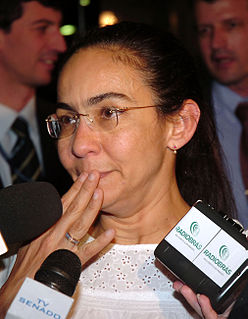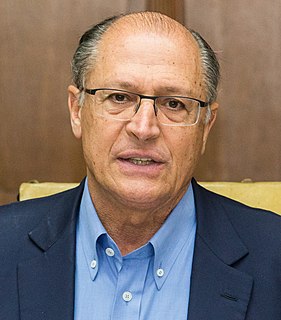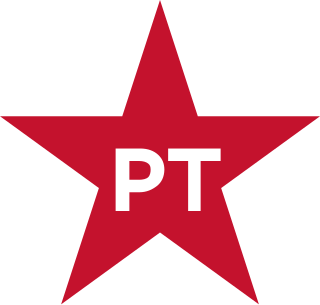Background
The 2006 election was held amid a clear reorganization of the political forces of the country. After three failed attempts, Workers' Party candidate Luiz Inácio Lula da Silva was eventually elected President. The financial market feared his government would be a threat to the new-found economic stability. Lula, once considered a member of the radical left wing, implemented unorthodox neoliberal policies on the economic field, resembling the Fernando Henrique Cardoso administration, but not succumbing, however, to privatization pressures. On the social field, Lula gained notice for Fome Zero, a successful measure to eradicate extreme poverty.

Fernando Henrique Cardoso, also known by his initials FHC, is a Brazilian sociologist, professor and politician who served as the 34th President of Brazil from January 1, 1995 to December 31, 2002. He was the first Brazilian president to be reelected for a subsequent term. An accomplished scholar noted for research on slavery and political theory, Cardoso has earned many honors including the Prince of Asturias Award for International Cooperation (2000) and the Kluge Prize from the US Library of Congress (2012).
Privatization can mean different things including moving something from the public sector into the private sector. It is also sometimes used as a synonym for deregulation when a heavily regulated private company or industry becomes less regulated. Government functions and services may also be privatized; in this case, private entities are tasked with the implementation of government programs or performance of government services that had previously been the purview of state-run agencies. Some examples include revenue collection, law enforcement, and prison management.

Fome Zero is a program of the Government of Brazil introduced by President Luiz Inácio Lula da Silva in 2003, with the goal to eradicate hunger and extreme poverty in the country.
The Workers' Party was, thus, deemed less socialist and more social democratic. As the party moved deeper into the centre-left spectrum, allying with centrist Brazilian Democratic Movement Party, a series of complaints were made by members of its far left factions, which accused it of betraying its ideals and founding charter. Despite the discredit of the Workers' Party among traditional leftists, they strongly supported Lula as the real left wing alternative. The Brazilian Communist Party, for instance, supported Lula on the second round, unlike its presidential candidate Heloísa Helena, informing its members of the alleged regression Geraldo Alckmin would represent if elected.

The Brazilian Communist Party, originally Partido Comunista do Brasil until 1958, is, disputedly, the oldest political party still active in Brazil, founded in 1922. It played an important role in the country's 20th-century history. It was one of the biggest parties in the country, maintaining, with PCdoB, an unified resistance against the dictatorship, but with the fall of the Soviet Union and the collapse of communism, the party lost power, and an internal coup in 1992 divided the party and formed a new party, called Socialist People's Party, using the former identification number of the PCB, 23.

Heloísa Helena Lima de Moraes Carvalho is a Brazilian nurse, schoolteacher, and politician, member of the political party Rede Sustentabilidade. She is the Brazilian woman to have received the third highest voting in a presidential race, ranking behind Marina Silva and Dilma Rousseff in 2010.

Geraldo José Rodrigues de Alckmin Filho is a Brazilian politician who served as the Governor of São Paulo from 2001 to 2006, and then again from 2011 to 2018. He was the Brazilian Social Democracy Party (PSDB) presidential nominee for the 2018 presidential election. He is usually described by political analysts and supporters as a pro-business centrist, closely associated with the political and financial establishment.
For this election, the opposition emphasized the wear off of Lula because of the Mensalão scandal, that involved the bribing of parliament members by the ruling coalition, which had been widely reported on the mass media since mid-2005. This wear off, however, appealed only to middle-class voters.

The Mensalão scandal was a vote-buying scandal that threatened to bring down the government of Luiz Inácio Lula da Silva in 2005. Mensalão is a neologism, a variant of the word for "big monthly payment".
Two former members of the Workers' Party, Cristovam Buarque and Heloísa Helena, launched their candidacies as "alternative left" candidates for the Democratic Labour Party and the Socialism and Liberty Party, respectively. They once discussed the possibility of forming a coalition themselves. Both parties were criticised by the left on the second round for not supporting Lula.

Cristovam Ricardo Cavalcanti Buarque, PhD is a Brazilian university professor and member of Popular Socialist Party (PPS). He is currently a Senator from the Federal District. He is married and has two children.

The Democratic Labour Party is a social democratic political party in Brazil.
The Socialism and Liberty Party is a Brazilian political party with 147,096 active members. PSOL is a left-wing to far-left party which is self-described as socialist and democratic.
The campaign for void voting reached its peak on the 2006 election, with MTV Brasil (unlike its American branch, which advocates voting initiatives like Rock the Vote among younger audiences) becoming the first TV network to officially support it.
Campaign
Starting from the end of 2005, the most discussed issues about the 2006 national elections involved the country's four biggest parties: PFL, PMDB, PSDB and PT.
President Luiz Inácio Lula da Silva (PT) ran for reelection , but he did not confirm his candidacy until June 2006. This was regarded as a cautious move in case something major happened on the political spectrum that could harm his candidacy, especially regarding the 2005 political scandal, still under investigation.
At the end of 2005, several names were regarded in the PSDB as potential candidates for the presidential elections, such as former president Fernando Henrique Cardoso, senator Tasso Jereissati, Minas Gerais governor Aécio Neves, São Paulo governor Geraldo Alckmin and São Paulo mayor José Serra. By the beginning of 2006, Alckmin and Serra were considered the only two actual potential candidates, and the other three would choose between them (or determine a way by which the choice would be made). Geraldo Alckmin was the chosen candidate, whereas Serra is running for governor of São Paulo.
The PFL was planning the candidacy of Rio de Janeiro mayor César Maia. Another possibility was to appoint the vice-president nominee for PSDB presidential candidate. Maia initially said he would agree with the latter only if the presidential candidate was José Serra, but later accepted the possibility of the party appointing a name to run with Geraldo Alckmin, which was eventually senator José Jorge.
In the PMDB there was division. Some, including party president Michel Temer, wanted the party to have a candidate of its own for the presidential race, and scheduled primaries within the party, with two prospective candidates: former Rio de Janeiro governor Anthony Garotinho and Rio Grande do Sul governor Germano Rigotto. Another section of the party, though, wished to ally with president Lula and appoint the vice-president nominee to run with him. This "governist part" of the party was headed by senators Renan Calheiros and José Sarney. There was also a third possibility of making an alliance with PSDB. The PMDB decided not to take any part in the presidential elections and became free to make any coalition in the states.
Aside from these four parties, the smaller ones had no clear course of action. The PSOL was the first to appoint a candidate, senator Heloisa Helena.
The three main candidates were later joined by Cristóvam Buarque (PDT), Luciano Bivar (PSL), José Maria Eymael (PSDC) and Rui Costa Pimenta (PCO). Ana Maria Rangel (PRP), who also registered her candidacy, was ruled out after internal disagreements with her own party, but was able to revert the situation and regain her right to participate in the presidential race.
The first debate took part on 14 August, featuring Heloisa Helena, Cristóvam Buarque, Luciano Bivar and José Maria Eymael. Lula refused to participate, whereas Rui Costa Pimenta was not invited.
On 15 August, the official electoral programmes started being aired on television and radio. Every weekday, all candidates have a few prime-time minutes to put forward their ideas and plans. The time allocated to each one is loosely based on the number of Congress representatives each coalition has.
Also on 15 August, the Supreme Electoral Court decided to revoke the registration of the PCO candidate, Rui Costa Pimenta. The court ruling was based on the fact that the party had not presented its accounts for the 2002 general elections within the deadline specified by law. Pimenta, however, managed to retain his candidacy: the matter is pending decision.
Polls varied little in the two months prior to the election, showing Lula with over 50% of the valid votes, followed by Alckmin, Heloisa Helena, and Buarque. Nevertheless, the difference between Lula's figures and the sum of his opponents' shortened on the eve of the election.
On 28 September, the PT candidate refused to appear at a debate hosted by Globo TV. Explaining his decision in a letter addressed to the TV station, Lula claimed that all his opponents would take the opportunity to team up and attack him. Three days before the election, the last debate was expected to have a large audience.
On 1 October the first round ended with no winner. Lula was the most voted, but his votes were around 1% less of the sum the other candidates', forcing him to a run-off with Alckmin, who placed second.
Run-Off
Despite being absent of the first-round debates, Lula faced Alckmin in four debates in the second round, each one of them aired by one of the four most important television channels in Brazil - Band, SBT, Record and two days before the election, on Globo TV.
Since the first debate, Alckmin accused Lula of being lenient with the members of his government who had to resign after being charged in many scandals since 2005. Also he tried to underestimate the achievements the president claimed to obtain during his term, like reducing of poverty and inflation rates, claiming his results were consequence of the favorable international economic scenario and the achievements of his antecessor Fernando Henrique Cardoso, from Alckmin's party.
Lula however claimed that despite his government is under investigation, both Cardoso and Alckmin halted many investigations on their administrations with dubious methods. According to analysts, Lula dealt damage to Alckmin most when he accused him of threatening the Bolsa Família program, which attends millions of low-income Brazilian families, and questioning the privatizations done during the Cardoso government claiming that most of them were unnecessary and the state companies in question were sold for sums much lower than their true market value, like the Vale do Rio Doce, sold by R$3.3 billion at the time, but now profits this same amount in a quarter of year. Also he claimed that there would be no guarantee that other companies could be sold like state oil giant Petrobras, the country's largest and most profitable company, in case of Alckmin's victory.
If the formula worked or not, the fact is Lula's poll numbers skyrocketed and in the end, he was elected for a second term as president of Brazil by a 20 million vote margin, while Alckmin got fewer votes than in the first round.







































